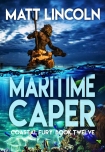The Saboteurs by Clive Cussler (top 10 best books of all time .TXT) 📗

- Author: Clive Cussler
Book online «The Saboteurs by Clive Cussler (top 10 best books of all time .TXT) 📗». Author Clive Cussler
“Hey, you’re not supposed to be here,” the man said indignantly.
“I don’t have time to explain, but Roosevelt’s life is in danger. Have they come through?” The man hesitated. Bell grabbed him by the collar. “Answer me, dammit.”
The worker’s eyes went wide. “Yes. A few minutes ago. They should be exiting the third chamber any minute.”
Bell ran. Each lock was a thousand feet long, a little over three football fields. And each was roughly thirty feet higher than the one before it. In all, a ninety-foot climb. Bell had given himself only thirty minutes’ rest after pushing his body for five hard hours and yet he ran. He’d come too far to fail now. For the mules to function, their tracks had to climb a steeply graded hill between each chamber before the path flattened out again. Bell staggered when he hit the first of these concrete rises, but he threw himself at the task and powered his way up and soon found himself running along the length of the middle lock, with a second daunting slope up ahead.
His heart raced, his chest ached, and his mouth was full of saliva. He ran on anyway, hoping the boat carrying the President was still in the third lock, stuck in place, while water filled it to the same level as the lake beyond.
Bell hit the second rise, where the path along the middle chamber transitioned to the upper one. His feet felt floppy, his steps unsure, but he kept at it, churning his legs to climb up to the final lock.
When he reached the top and could look down the length of the chamber, his heart sank.
Because the lake was still filling, a regular ship couldn’t yet transit the locks. There wasn’t enough water in the upper chamber to float a vessel with a standard keel. In order to fulfill TR’s wish, Goethals had had a pontoon boat constructed, with a few dozen metal barrels welded together and a wooden deck laid over them. Two men operated outboard motors at the stern, while the rest of the ungainly craft was shaded by a bright white canopy under which the former President would lunch with local dignitaries while a brass band, standing on a dais between the helmsman and guests, belted out some jaunty rags.
The odd, rectangular boat was now at the far end of the chamber, and the gates were about to open. Usually, the deck of a ship transiting the canal would be at or above the height of the lock’s walls, yet, with the lake so low, the special boat sat twenty feet below where Bell stood.
To Bell’s right, a short distance away, was the concrete spillway of the Gatun Dam, and somewhere close to its face was a massive charge of explosives. The boat needed only to exit the chamber to put itself in danger.
Bell ran harder than ever. He would not fail.
The distant gates continued to yawn open, driven by surprisingly small motors due to their impeccable balance. Bell pulled his .45 and considered firing it to get people’s attention but realized it would have opposite the effect he wanted. They would want to flee into the perceived safety of the open lake. He looked to his right again and saw a figure crouched on the lake’s shore pulling up something from below the surface. Though the man was screened by a thicket of tall grasses, Bell thought he saw a detonator with a T-handled plunger next to him.
Macalister.
The range was so extreme, and Bell was breathing so hard, he’d never hold steady enough to fire, yet he had to take the shot. He stopped and hunched slightly in a two-handed grip that had become more instinct than intention. He estimated the range at a hundred yards and knew the bullet would be seven inches below his aim at that distance.
A round was already chambered, and so he cycled through all eight bullets as fast as he could pull the trigger, denying Macalister any time to duck behind the cover of the copse of trees farther up the bank. As with a golfer who always aims for the cup on a par 3 yet inevitably misses, there are still tales told at every country club of someone sinking a ball in one shot. Isaac Bell hit his shot. He saw a spray of blood blow from the spy’s body and he collapsed onto the ground.
Bell paused, his chest heaving. Was it a kill shot? Was this nightmare over?
Seconds trickled by. Macalister slowly lifted himself from the muddy lakeshore, appearing to be favoring his left arm. He tried to haul up more of what had to be electric fuses attached to the mines but lacked the strength. Bell saw him turn his attention to the detonator.
He started running again. The gate at the end of the lock was fully retracted into slots in the chamber walls, and the two mules on either side pulled the pontoon boat forward. The band was so loud, and the distance too great, for anyone to have heard the shots. The gawky raft’s nose peeked out of the chamber when it paused for the mooring lines to be recovered.
Bell pushed harder. White water formed under the vessel’s flat transom as the two men operating the outboards gave them gas. All Bell heard was the throb of the band—a tuba, a trombone, a showy trumpet, and a snare drum. The boat was under way, moving slow, slower than Bell at the moment, but it would accelerate, and TR would surely want to investigate the spillway. He’d be right over the bomb when Macalister touched it off.
Bell ran past the electric locomotive without giving its operator a glance. The pontoon boat was out of the chamber now and beginning a starboard turn toward the dam. Bell was twenty





Comments (0)